
PREV ARTICLE
NEXT ARTICLE
FULL ISSUE
PREV FULL ISSUE
EARLY AMERICAN CALENDAR MEDALSAlan V. Weinberg submitted these notes and images about the earliest American calendar medals. Thanks! -Editor
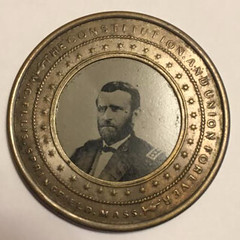 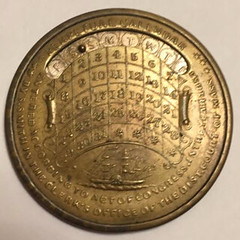
Grant Calendar Medal Duane Feisel avers that [American] calendar medals, in his lengthy experience, first originated during the 1892-93 Worlds Fair Columbian Exposition. Actually, American calendar medals date back , in my experience, to 1855 (non-mechanical) and 1857 to 1859 (mechanical, protruding metallic nub moves days of the week) with foreign calendar medals going back centuries earlier. But let's just address American mechanical calendar medals as that is what Feisel addresses. First, there is the pictorial George Washington mechanical calendar medals of 1857-59 by Benjamin C. True, Cinn. diesinker & 1858 by Peter J. Jacobus Phila. diesinker, Baker #'s 385 thru 387, the latter calendar medal rather common, the former moderately scarce. In choice condition - they range around $125. But in a much higher price range & considerably rarer than your mass-produced & common Worlds Fair Columbian Expo (and later) mechanical calendar medals, there is the 1860 Campaign ferrotype (mini-tintype) versions of a clean shaven Abraham Lincoln (Captain Andrew C. Zabriskie coll'n, Sotheby's 6 /1999 lot 530- catalogue cover plate image ) at an astonishing & unsurpassed $38,500, 18 years ago! Into the Civil War and post-War political campaigns, Col. Elmer Ellsworth the 1st Union officer killed by a Confederate soldier in 1861 ferrotype mechanical calendar medal. And 1868 Presidential Campaign & victor "jugate" Gen'l U.S. Grant with VP Stephen Colfax ( JJ Ford, Jr Stack's 9 /2013 lot 12163 ) at $5,581 and Grant alone ( Ford, lot 12164 ) at $2,585. There is also reported a ferrotype calendar medal version of Major Robert Anderson Fort Sumter commanding officer. Both the Ellsworth and Anderson ferrotype mechanical calendar medals would be worth each solid four figures. On all these ferrotype mechanical calendar medals, you can count each known population on the fingers of one hand and they are tightly- held. Rarer than your 1804 $, 1913 5c or 1894-S 10c. And a lot more affordable, yet more challenging to acquire. Not to speak of that many of those extant are not perfect condition. 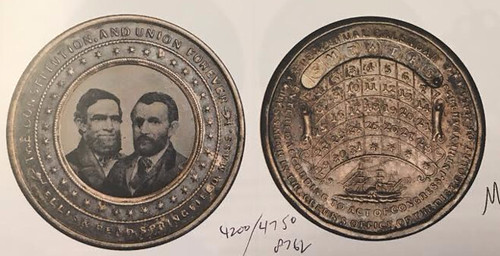
Grant-Colfax Calendar Medal 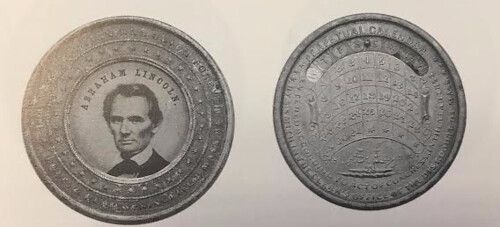
Abraham Lincoln Calendar Medal Hemerologe Medals
Eric Schena submitted this great information about another type of early calendar medal. Thanks! -Editor
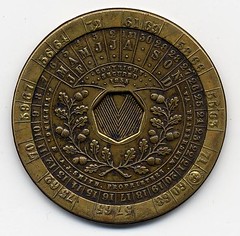 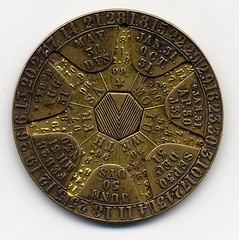 I have seen the discussion of perpetual calendars and thought I would chime in about one that is somewhat local to us in the D.C. region. In my collection, I have a brass "Hemerologe" made by James Tipping in Winchester, VA in the 1850s. It is made in two pieces and is supposed to be able to give the date "in all perpetuity." The two storecards are interesting: they are made in two pieces with one inside the other almost like a shellcard. The letter punches for both storecards appear to have also been used to make the hemerologe. Not only that, both shellcards have different addresses even though they are for the same merchant. 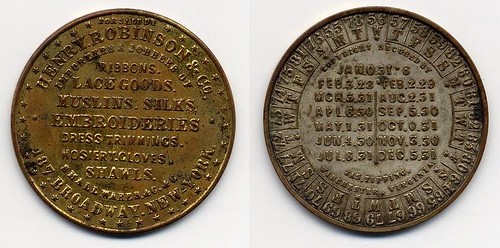 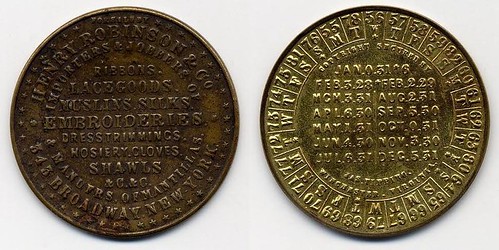 Back in 2011, I wrote a brief article in The Virginia Numismatist about it and included some images of a broadside advertising the hemerologe. Here's what I wrote: In the mid to late 19th century, pocket calendars were a popular item and many tokens from the 1870s advertise several such calendars. One such calendar was produced and marketed by James Tipping of Winchester, Virginia. James Tipping was born in Ireland around 1818 and eventually became a retailer in crockery and dry goods whose store was located on Loudoun St. between Piccadilly and Water (Boscawen) Sts. He also partnered with A. J. Smith to help produce the “Hemerologe, or Medallic calendar, for current use to all futurity, as well as for reference to any date in the Nineteenth Century designed for the pocket”. The hemerologe is a 45 mm diameter two piece dial calendar which allowed the user to see which day of the week falls when for any date up to 1900. There appear to have been two different versions of the hemerologe: one which was illustrated in an 1854 broadside and a revised version that was produced in 1855. Tipping also entered a copyright on April 10, 1857 for a “lunar hemerologe”, and is currently known through a notation in the 1856-1857 Accession Record of the Smithsonian Institution. Tipping’s Hemerologe was evidently marketed and retailed by Henry Robinson & Co., Broadway, New York. Robinson issued two different store cards (with different street addresses) made in two pieces of thin brass 38 mm in diameter, with the calendar side set inside the larger advertising side. The hemerologe and both store cards share the same letter punches as well as overall style, thus were presumably made by the same maker, which may have been Tipping and Smith themselves, as Winchester had a flourishing copper and silver smith industry at the time. Thanks again everyone, for the great information on these rare items. -Editor
To read the earlier E-Sylum articles, see:
 Wayne Homren, Editor The Numismatic Bibliomania Society is a non-profit organization promoting numismatic literature. See our web site at coinbooks.org. To submit items for publication in The E-Sylum, write to the Editor at this address: whomren@gmail.com To subscribe go to: https://my.binhost.com/lists/listinfo/esylum All Rights Reserved. NBS Home Page Contact the NBS webmaster 
|